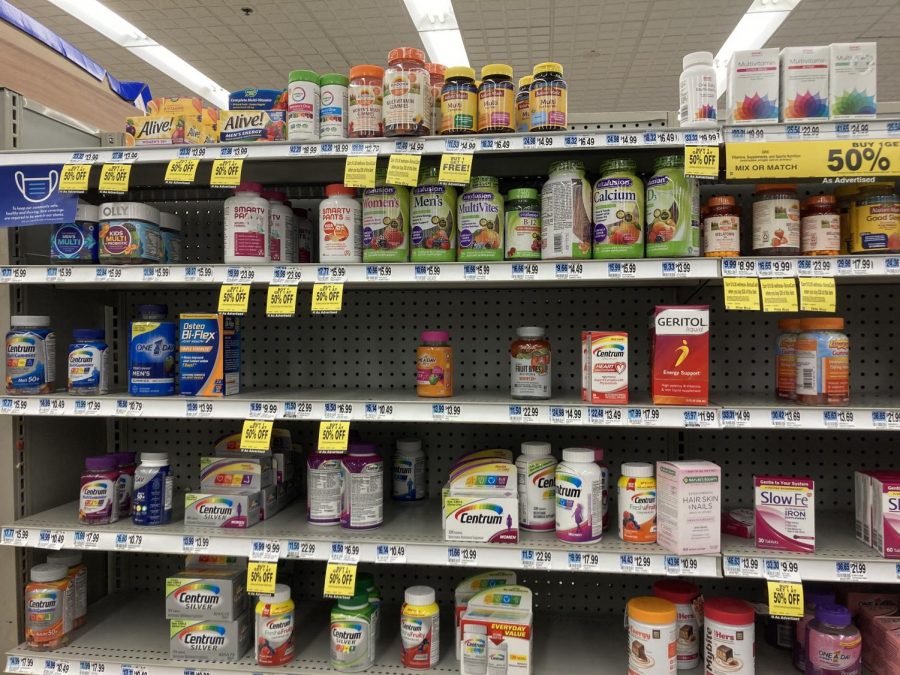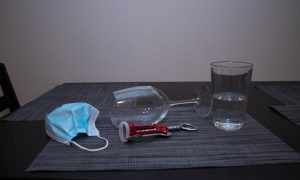Winter Is Coming: Suit Up and Boost Your Immune System
Vitamin supplements are one way to give the immune system a boost, which is especially important during the pandemic and flu season.
December 4, 2020
Winter and flu season are upon us. As the coronavirus shows no signs of stopping anytime soon, it is more important now than ever to maintain a strong and healthy immune system.
Because COVID-19 and the flu display similar symptoms, being healthy is imperative to preventing viral spread. There are several ways to boost the immune system, such as eating healthy foods, exercising, getting proper sleep, taking vitamin and mineral supplements, and taking active measures to prevent infections.
Dietary Changes
Maintaining a healthy diet is no new surprise to staying healthy overall. The body functions at its best with sufficient intake of different nutrients. However, certain foods contain vitamins and minerals that can improve the immune system, such as zinc, selenium, and vitamins A, B6, C and D3.
Zinc is an important mineral for “fighting off invading bacteria and viruses,” according to the National Institutes of Health. It is also necessary for protein and DNA production in all cells and for the development of infants and children. Zinc can be found in foods such as oysters, red meat, poultry, seafood, beans, nuts, grains and dairy products.
Of course, simply eating right may not be enough to receive proper amounts of these vitamins and minerals.
Selenium is a trace element that plays a vital role in a number of crucial bodily functions, including “protection from oxidative damage and infection.” Brazil nuts are the best source of selenium, but it can also be found in fish, red meats, poultry, grains and dairy products.
Vitamin A helps improve organ function being important for vision, immunity and reproduction. Beef liver, salmon, green leafy vegetables, apricots, mangoes, dairy and fortified cereals are all sources of vitamin A.
Vitamin C acts as an antioxidant and aids in collagen production and immune system function. Oranges and grapefruits are excellent sources, as are broccoli, strawberries and tomatoes.
Vitamin D3 is one of the two main forms of vitamin D. Necessary for calcium absorption and bone health, it also reduces inflammation and regulates immune and neuromuscular function. Fatty fish, like salmon and tuna, as well as fish liver oils, are the best sources of D3, but it can also be provided by fortified milks, cheeses and cereals. One of the easiest ways to absorb vitamin D3 is through sunlight.
Of course, simply eating right may not be enough to receive proper amounts of these vitamins and minerals. Supplements are an excellent way to bridge the gap in deficiencies and to make sure the body gets what it needs to stay strong. Vitamin D is particularly important to the immune system but with fewer natural sources, taking supplements may be necessary.
Recent studies from the Mayo Clinic have found correlations between vitamin D deficiencies and an increased likelihood of testing positive for COVID-19. Furthermore, the risk of death from acute respiratory failure was also reported to have increased. Such deficiencies are largely found in members of Black and Latinx communities, as well as among the elderly.
Be cautious of excessive disinfecting, especially when it comes to your skin.
Additionally, according to the Centers for Disease Control and Prevention, racial and ethnic minority groups and adults over 65 years of age are at higher risks of contracting the coronavirus. For members of these communities, it is even more important to adopt cautious and healthy habits during this time when the spread of infectious diseases is very high.
As with any medical concern, it is important to contact your primary care provider before starting new over-the-counter supplements and medications to ensure you are getting the correct and necessary doses.
Behavioral Changes
Exercise is another method of strengthening immunity. While there is no direct correlation between physical activity and the immune system, exercise promotes general good health in addition to healthy eating. The cardiovascular system’s strength is improved with exercise, which in turn fosters better blood circulation, an important function to transport nutrients throughout the body.
Getting enough sleep is also important to the state of one’s immune system. According to the Mayo Clinic, cytokines are proteins released throughout the body during sleep. Production of these proteins increases with the presence of infection and inflammation. However, sleep deprivation impedes this process. Go to bed at a reasonable time now and then rather than continuously staying up during the holidays.
Finally, active preventative measures reduce the likelihood of contracting unwanted bacteria and viruses. Practicing good hygiene like covering coughs and sneezes, hand-washing, and not picking at healing wounds or blemishes prevents the spread of bacteria and development of sickness. Additionally, staying up-to-date on vaccinations for measles, HIV and the most recent flu virus creates the necessary antibodies required to fight off infection.
Be cautious of excessive disinfecting, especially when it comes to your skin. Too much washing can remove the natural good bacteria and oils on the skin that protect the rest of the body from invading germs.
As winter and the holiday season approach, a majority of students, faculty and staff are going and staying home for winter break. While staying home may seem like a simple and easy solution to avoiding the flu, coronavirus and common colds, it is imperative that individuals practice habits that will not only boost immune systems, but that will also prevent the spread of infection and sickness, such as practicing social distancing and maintaining proper hygiene.
















